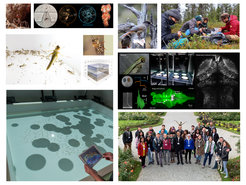Applications open for new Max Planck – Uni Konstanz doctoral program
The new International Max Planck Research School for Quantitative Behaviour, Ecology and Evolution from lab to field (IMPRS-QBEE) has launched—offering doctoral projects for 2022

The Max Planck Institute of Animal Behavior (MPI-AB) together with the Department of Biology from the University of Konstanz have launched a new doctoral program—the IMPRS-QBEE—for 2022.
The IMPRS-QBEE is a structured graduate program for doctoral candidates from around the world whose research interests lie within the fields of animal behavior, ecology, evolution, physiology, and neurobiology.
The faculty—comprising over 30 leading researchers from the MPI-AB and university’s Department of Biology—have kicked off the 2022 program with a range of doctoral projects from the neural basis of behavior to the dynamics of entire animal societies to deploying cutting edge tech to compare human and non-human animal cognition. Applications are now open for doctoral candidates www.ab.mpg.de/registration
“The vision of the MPI-AB lays the foundation for the new IMPRS-QBEE in that we shall prepare our IMPRS graduates to understand and predict behavior, ecology, and evolution in the natural world,” says Martin Wikelski, MPI-AB Managing Director.
A reimagined program
The IMPRS-QBEE builds on the successful doctoral program, the IMPRS for Organismal Biology, which operated for 12 years as a partnership between the Max Planck Institute for Ornithology and the University of Konstanz. When the new MPI-AB was founded in Konstanz in 2019, it set in motion plans for an in depth reimagined doctoral program that would reflect the thematic foci of the Institute’s three departments led by Iain Couzin, Meg Crofoot and Martin Wikelski.
IMPRS-QBEE intends to equip doctoral students with expertise to excel in both the lab and in the field. They will have access to state-of-the-art quantitative tools such as advanced imaging, animal tracking, and virtual reality systems, as well as, benefit from longstanding international collaborations at MPI-AB’s field locations, such as the Smithsonian Tropical Research Institute in Panama and the Mpala Research Center in Kenya.
Give-and-take supervision
Doctoral students will work closely with their supervisor on research projects and additional mentoring is provided by Thesis Advisory Committee members on developing the thesis. In addition, the program offers a first-class curriculum to develop specific research skills and transferable skills, as well as support in networking and career advice—providing the mentorship necessary for doctoral students to feel empowered about their future career.
“The goal is that our students feel encouraged to tap into their creativity within existing ethical frameworks, and to see their doctoral experience as a process of receiving training but also giving their own expertise back to the community,” says Francisca Rosa Mende, coordinator of the IMPRS-QBEE. “Our plan is for doctoral students to become mentors to junior fellows in their final year.”
Equity and diversity
The IMPRS-QBEE introduces fresh ideas to match the visions of the newly-founded institute and its members: one focus will be the targeted approach and support of students who do not come from "classic" research-strong countries. “Due to our large share of field research, especially in African countries, we see this increased support as our obligation, which will benefit the overall diversity within our new program, but also the Max Planck Society as a whole,” says Rosa Mende.
“Together with our partners in the department of Biology at the University of Konstanz, we strive to lower the barriers for candidates from underrepresented backgrounds. We want all candidates to have an equal chance at entering our doctoral program and taking that first step towards a successful career in the fields of animal behavior, ecology, evolution, physiology, neurobiology, and beyond.”












